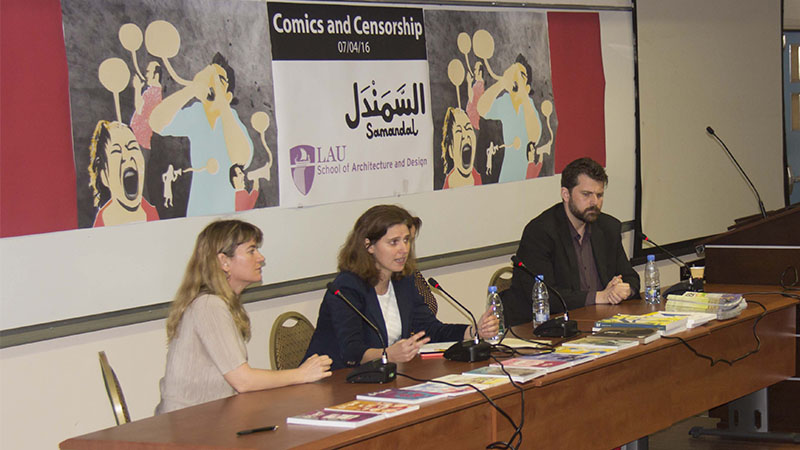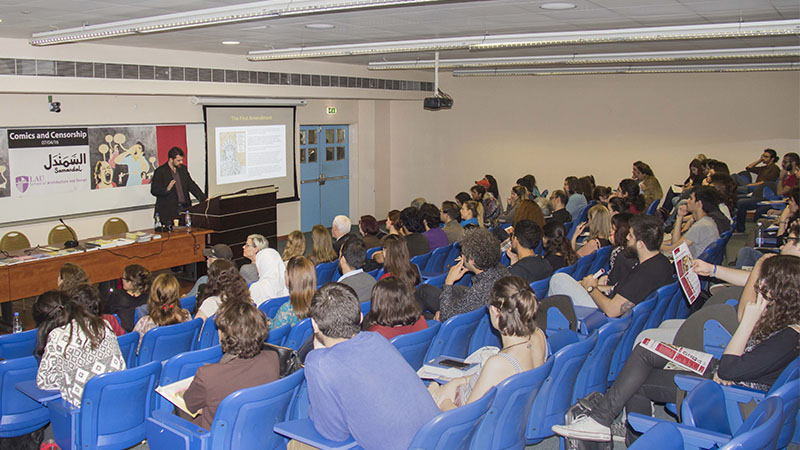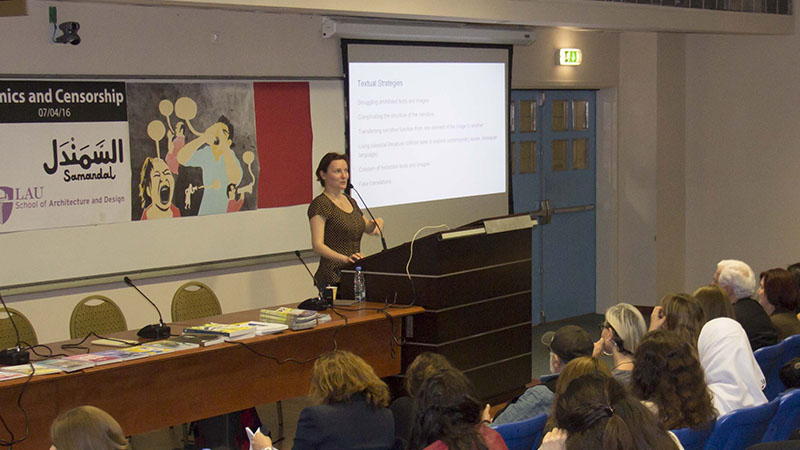Creativity and Compromise
A symposium hosted by the LAU Department of Design at the Beirut campus earlier this month brought together a range of experts to illuminate current debate on censorship in Lebanon and beyond. Dr. Lena Merhej led a panel discussion featuring Charles Brownstein, Dr. Irina Chiaburu and Rana Saghieh.
The main focus of the debate sprung from the recent court case brought against the Lebanese non-profit Samandal. An organization dedicated to the advancement of the art of comics in Lebanon and the rest of the world, Samandal was charged with defamation and slander against the Christian religion and inciting sectarian strife in 2009. According to a statement from Samandal “The comics themselves address religion only tangentially and deal satirically with completely different subjects. However, a handful of panels were selectively taken out of context as proof of blasphemy.” This case is seen as far from isolated in Lebanon. It is, according to Samandal, part of a much larger and longstanding “practice of arbitrary and unjust state censorship.”
The reality of consistent and pervasive censorship in Lebanon was the source of interest for hosting this debate. As Merhej, a co-founder of Samandal and organizer said in her opening, “censorship is a hot topic.” It is also a topic with particular relevance to the Arab world according to Yasmine Taan, Head of the Department of Design. “Arab countries are known for censorship and this has increased since the Arab spring,” she said, “it as increased in Lebanon as well which as stirred worry and a call for debate.”
It is a prescient topic for the university and its students as well who are “demonstrating a growing interest in visual storytelling” according to Taan. The university is keen to meet this demand and also help its students understand the kind of environment they’ll be entering as practicing artists.
The panel discussion demonstrated the global and historical prevalence of censorship as well as the different forms it takes and purposes it professes to serve. Charles Brownstein is the chair of the Banned Books Week Coalition and Executive Director of the Comic Book Legal Defense Fund as well as being a sought after speaker on the history of comics and censorship. In his talk, “Censorship of Comics as the Exercise of Social Control,” drew on the experience of comic artists in the USA where despite the right to free speech being protected by the First Amendment of the country’s constitution, “it is almost never clear cut as it would seem.”
He detailed historical cases as well as current trends that reveal how this right has been, and still is controversial in the USA, particularly in relation to comic art. As a country with a relatively admirable history of preserving free speech, Brownstein’s talk reminded the audience “The right to free expression, in the United States and elsewhere, can never be taken for granted.”
Irina Chiaburu brought to the discussion an example from the opposite end of the spectrum. She holds a PhD from Jacobs University and her research investigates censorship during the Brezhnev era of the Soviet Union between 1964 and 1984. In this period there was strong and expansive bureaucracy and censorship and the intellectualism was seen as dangerous and subversive, according to Chiaburu. This created a “challenge to negotiate staying on the right side of the law while maintaining integrity as an artist,” she said.
Her talk entitled “Finding Censorship’s Blind Spots: Late Soviet Experience”, provided insight into the mechanisms of censorship and the difficulties censors faced that were exploited by artists to effectively sidestep the vast soviet censorship machine. Her talk focused what can happen when censorship is both broad and enduring. In these cases she said, “people learn to read between the lines… It’s important to raise a community of readers to make censorship obsolete.” She finished with the question however of whether this subversion is really transformative or merely a form of self-censorship.
This question is particularly pertinent to Rana Saghieh’s talk “Censorship on Artistic Freedom” which focused on censorship in Lebanon today. Saghieh was one of the lawyers representing Samandal and has considerable experience and expertise on the implementation of censorship in the Lebanese legal system. Lebanese artists are up against increasing censorship and according to Saghieh there is no transparency or consistency, leaving people exposed to harsh punishments for something as small as a tweet. “The worst effect of censorship is not the fine but the resulting self-censorship to avoid the fine,” she said. There is opportunity for change however Saghieh says. Through public discourse and media coverage as well as engaging with the issues that are seen as “red lines” such as sexuality and religion, civil society can challenge the current norms.
In the provocative debate that followed the panel Brownstein reinforced this point saying, “showing that there is a large and engaged community can discourage systematic censorship.” It was a call to action for the students and attendees to continue the dialogue beyond the symposium or classroom, to continue to challenge censorship and question its role in the society they want to build and contribute to.


